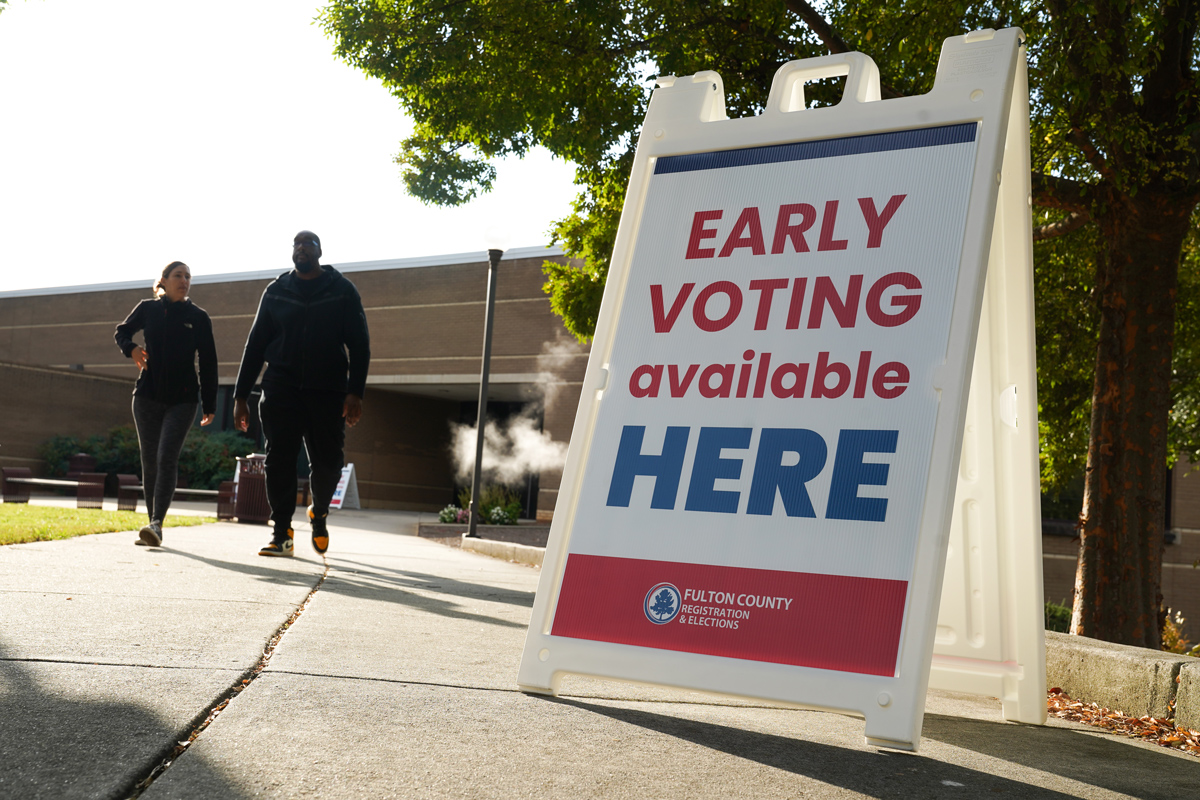
Photograph by Megan Varner/Getty Images
The 2020 presidential election started out normally enough for Fulton County poll workers. Angie Jones, a site manager, began her day at her voting location at five a.m. But before she prepared the Dominion voting machines or organized standing areas for poll watchers, Jones joined the entire poll worker team—assistant managers, clerks, and technicians alike—to recite and sign their respective state oaths. This ritual is done before every election, big and small, to promise that poll workers will “truly, impartially, and faithfully perform” their duties. “In 2020, the general election went smoothly for us, and nothing stood out as unusual,” Jones says. “[But] after we closed at seven p.m. and Donald Trump was losing Georgia, the focus was on us.”
Fulton County is a majority-Democrat county that includes most of the City of Atlanta. Comprising 11 percent of the state’s electorate, no county holds more weight when it comes to swinging the swing state. After President Biden won Georgia in 2020, then-President Trump and his former campaign lawyer Rudy Giuliani zeroed in on Fulton County, accusing poll workers there of ballot stuffing, and spreading false claims of widespread voter fraud. In 2024, an investigation by the Georgia secretary of state’s office found evidence that Fulton County poll workers scanned some ballots twice, but there was no evidence of fraud or conspiracy. Charlene McGowan, general counsel for the secretary of state, later stressed that the duplicate scans did not change the election outcome. In response, independent monitors were appointed to observe Fulton County polls during the general election this November.
Jones has worked several local and national elections in Fulton County since 2018 and says unruly behavior and conspiracy claims have become common. Voters have demanded to enter poll sites while wearing candidate merchandise, which is against state law, or attempted to vote at other precincts after their assigned precinct is closed. One person insisted to Jones, without evidence, that undocumented immigrants were illegally voting. “Ninety percent of people vote with no issue and go about their day,” Jones says. “There’s the 10 percent that get ugly and make claims. My concern is that 90 percent used to be 99, and the 10 percent used to be 1.”
When Jones was growing up, her family was active in politics; her uncle was a state senator, and her father volunteered for Republican campaigns. Her political awakening came after her friend’s son came out as gay, and the church both families attended subsequently shunned Jones’s friend. “I was shocked that something awful like this happened to someone I love,” Jones says. “I questioned everything I believed at the time, and I realized something was very wrong with my ideology and the politics that were tied to it.” The incident inspired her to become more politically active. She volunteered for Jon Ossoff’s U.S. House campaign in 2017, and became a Fulton County poll worker the following year. “When I walk into a polling place, I am there to serve the public, and not as a partisan—that is why we start with the oath,” Jones says.
This election, she’ll serve as a compliance officer, visiting six different precincts to verify that they are following state law. “Our training doesn’t change for the big one, but all poll workers are more aware that there are bad actors,” Jones says. “To say that we are on edge is too strong of a word, but I know now that people may want to disrupt our process.”
This article appears in our November 2024 issue.
Advertisement




